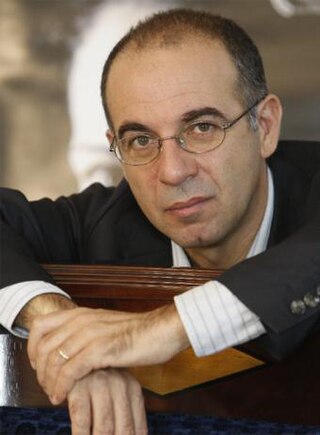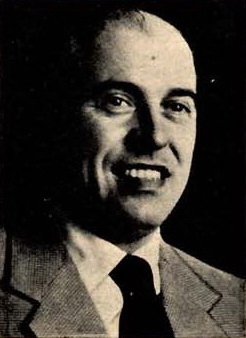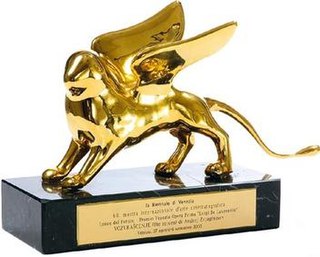
Juan Moreno y Herrera-Jiménez, better known as Jean Reno, is a French actor. He has worked in American, French, English, Japanese, Spanish and Italian movie productions; Reno appeared in films such as Flushed Away (2006), Crimson Rivers (2000), Godzilla (1998), The Da Vinci Code (2006), Mission: Impossible (1996), The Pink Panther (2006), Ronin (1998), Les Visiteurs (1993), Wasabi (2001), The Big Blue (1988), Hector and the Search for Happiness (2014), La Femme Nikita (1990), and Léon: The Professional (1994).

Roberto Gastone Zeffiro Rossellini was an Italian film director, screenwriter and producer. He was one of the most prominent directors of the Italian neorealist cinema, contributing to the movement with films such as Rome, Open City (1945), Paisan (1946), and Germany, Year Zero (1948). He is also known for his films starring Ingrid Bergman, Stromboli (1950), Europe '51 (1952), Journey to Italy (1954), Fear (1954) and Joan of Arc at the Stake (1954).

Italian neorealism, also known as the Golden Age, was a national film movement characterized by stories set amongst the poor and the working class. They are filmed on location, frequently with non-professional actors. They primarily address the difficult economic and moral conditions of post-World War II Italy, representing changes in the Italian psyche and conditions of everyday life, including poverty, oppression, injustice and desperation.

Giuseppe Tornatore is an Italian film director and screenwriter. He is considered one of the directors who brought critical acclaim back to Italian cinema. In a career spanning over 30 years he is best known for directing and writing drama films such as Everybody's Fine, The Legend of 1900, Malèna, Baarìa and The Best Offer. His most noted film is Cinema Paradiso, for which Tornatore won the Academy Award for Best Foreign Language Film. He has also directed several advertising campaigns for Dolce & Gabbana.

Valentina Cortese, sometimes credited as Valentina Cortesa, was an Italian film and theatre actress. In her 50 years spanning career, she appeared in films of Italian and international directors like Michelangelo Antonioni, Federico Fellini, Franco Zeffirelli, François Truffaut, Terry Gilliam, Joseph L. Mankiewicz and others.

Carlo Fortunato Pietro Ponti Sr.OMRI was an Italian film producer with more than 140 productions to his credit. Along with Dino De Laurentiis, he is credited with reinvigorating and popularizing Italian cinema post-World War II, producing some of the country's most acclaimed and financially-successful films of the 1950s and 1960s.

Mario Alberto Ettore Monicelli was an Italian film director and screenwriter, one of the masters of the commedia all'italiana. He was nominated six times for an Oscar, and received the Golden Lion for his career.
A semidocumentary is a form of book, film, or television program presenting a fictional story that incorporates many factual details or actual events, or which is presented in a manner similar to a documentary.

The Golden Lion is the highest prize given to a film at the Venice Film Festival. The prize was introduced in 1949 by the organizing committee and is now regarded as one of the film industry's most prestigious and distinguished prizes. In 1970, a second Golden Lion was introduced; this is an honorary award for people who have made an important contribution to cinema.
The 20th Academy Awards were held on March 20, 1948, to honor the films of 1947. It is notable for being the last Oscars until 2005 in which no film won more than three awards.

Pietro Germi was an Italian film director, screenwriter, and actor, noted for his development of the neorealist and commedia all'italiana genres.
A list of some notable films produced in the Cinema of Italy ordered by year and decade of release For an alphabetical list of articles on Italian films see Category:Italian films.

Dino Risi was an Italian film director. With Mario Monicelli, Luigi Comencini, Nanni Loy and Ettore Scola, he was one of the masters of commedia all'italiana.

Mario Soldati was an Italian writer and film director. In 1954, he won the Strega Prize for Lettere da Capri. He directed several works adapted from novels, and worked with leading Italian actresses, such as Sophia Loren and Gina Lollobrigida.

Goffredo Alessandrini was an Italian scriptwriter and film director. He also acted, edited, and produced some films.

Mario Mattoli was an Italian film director and screenwriter. He directed 86 films between 1934 and 1966.

Marcello Marchesi was an Italian author, screenwriter and film director. He wrote more than 60 films between 1939 and 1977. He also directed six films between 1951 and 1952. He was born in Milan and died in San Giovanni di Sinis, Cabras, Italy.

The Mysterious Rider is a 1948 Italian historical-adventure film directed by Riccardo Freda.

The Charterhouse of Parma is a 1948 French-Italian historical drama film directed by Christian-Jaque and starring Renée Faure, Gérard Philipe and Maria Casarès. It is based on the 1839 novel of the same name by Stendhal. The film's sets were created by the art directors Jean d'Eaubonne and Ottavio Scotti and the costumes were designed by Georges Annenkov. The film was made at the Cinecittà Studios in Rome while location shooting took place in Italy around Milan and Lake Como.

Francinex was a French film production and distribution company active from the 1930s to the 1960s. It had its roots in Italian production interests before the Second World War, who were able to continue during the conflict due to film agreements between Mussolini's Italy and Vichy France. The company was part of the Filmsonor-Cinedis group, but then passed under the direct control of the Italian producer Angelo Rizzoli in 1951. It was involved in many post-war co-productions with Italy including the popular Don Camillo series as well as the Fellini films Boccaccio '70 (1962) and 8½ (1963).


















